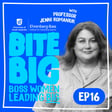
Ep.3: Thinking Different- Our ADHD Journey
In episode 3 of SEMI-PRECIOUS Amber and Jade unpack their ADHD diagnosis journey and the impact it’s had on their lives thus far.
Warning: this episode is not as amusing or witty as you might have come to expect if you have listened to Episode 1 and 2 so if you are in need of light relief then this might not be your vibe. Sorry, not sorry 😘
Tune in if you want to hear Jade slipping into Counsellor mode with her soft inquisitive “I’m curious, help me to understand” voice and Amber explain her SEMI-PRECIOUS moment as one that could have had her arrested an imprisoned in an overseas country.
Connect with Jade:
If you are wanting to understand more about Jade and her counselling practice or ADHD Coaching you can visit Awaken Insights, Awaken ADHD or on socials Instagram.
jade@awakeninsights.com.au
Connect with Amber:
If you’ are curious about Amber and her brand agency you can visit The Edison Agency or follow her on socials LinkedIn or Instagram
CREDITS
Producer: Amber Bonney and Jade Bonney
Hosts: Amber Bonney and Jade Bonney
Sound Editing: Jade Bonney
Social Content Creator: Ashton Bonney-Wright, Entice Media
Creative Director: Amber Bonney
To follow and subscribe to your mildly unhinged SEMI-PRECIOUS hosts, you can connect via Instagram








